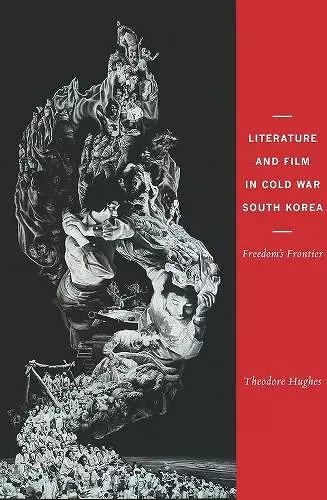Literature and Film in Cold War South Korea
Freedom's Frontier
Format:Hardback
Publisher:Columbia University Press
Published:13th Apr '12
Currently unavailable, and unfortunately no date known when it will be back

Korean writers and filmmakers layered literary and visual cultures in numerous ways under Japanese colonial rule (1910-1945). Taking advantage of new modes and media that emerged in the early twentieth century, these artists sought and utilized subtle strategies for representing the realities of colonialism and global modernity. Theodore Hughes begins by unpacking the interactions among literature, film, and art during this period, paying particular attention to the emerging proletarian movement, literary modernism, nativism, and wartime mobilization. He then demonstrates how these developments informed the efforts of post-1945 writers and filmmakers as they confronted the aftershocks of colonialism, war, and the formation of separate regimes in North and South Korea.
Korean writers and filmmakers crossed literary and visual cultures in multilayered ways under Japanese colonial rule (1910-1945). Taking advantage of new modes and media that emerged in the early twentieth century, these artists sought subtle strategies for representing the realities of colonialism and global modernity. Theodore Hughes begins by unpacking the relations among literature, film, and art in Korea's colonial period, paying particular attention to the emerging proletarian movement, literary modernism, nativism, and wartime mobilization. He then demonstrates how these developments informed the efforts of post-1945 writers and filmmakers as they confronted the aftershocks of colonialism and the formation of separate regimes in North and South Korea. Hughes puts neglected Korean literary texts, art, and film into conversation with studies on Japanese imperialism and Korea's colonial history. At the same time, he locates post-1945 South Korean cultural production within the transnational circulation of texts, ideas, and images that took place in the first three decades of the Cold War. The incorporation of the Korean Peninsula into the global Cold War order, Hughes argues, must be understood through the politics of the visual. In Literature and Film in Cold War South Korea, he identifies ways of seeing that are central to the organization of a postcolonial culture of division, authoritarianism, and modernization.
Theodore Hughes's ambitious new study shows us how Korea's colonial past persisted beyond its 'liberation.' Taking up literature, film, and art, he traces a modern history of the senses, mapping the production, reproduction, and contestation of a new culture of visibility (and invisibility) in the decades before and after 1945. Sophisticated and engaging, Literature and Film in Cold War South Korea is a milestone in the study of East Asian modernity. -- Michael K. Bourdaghs, University of Chicago, author of Sayonara Amerika, Sayonara Nippon: A Geopolitical Prehistory of J-Pop Step by step Theodore Hughes will convince you the visual/verbal relationship that developed in the Korean colonial period has everything to do with the very foundations and logics of the postcolonial, Cold War South Korean developmental state, regime, and aesthetic. In so doing, he profoundly disrupts received histories of 'Korean' literature and received approaches to canonical literary and film texts. It is not an exaggeration to say that with Hughes, you will simply 'see' Korea differently. This is a must read for all those interested in the Koreas, the Cold War, and non-Western modernities at large. -- Nancy Abelmann, University of Illinois Theodore Hughes's book breaks new ground in the study of postliberation South Korean literary and visual culture. His insightful and nuanced readings of the inextricable links between 'the colonial modern' and South Korea's Cold War modernity are essential contributions to Korean studies scholarship in any language. -- Kyeong-Hee Choi, University of Chicago Literature and Film in Cold War South Korea deftly navigates various transitional historical moments, such as Korea's liberation, the outbreak of the Korean War, and the rise of a feverish anticommunist campaign in South Korea, while addressing the works of both canonical and often overlooked writers in Korean literature from the 1920s to 1970s. All in all, this is a masterful survey and analysis of twentieth-century Korean literary and visual culture that will bring an exciting new perspective to the field. -- Suk-Young Kim, University of California, Santa Barbara Head and shoulders above its competition. -- Kyu Hyun Kim Cross Currents Hughes delivers a postcolonial study of Korea's modern literary and cinematic history that no East Asian collection can be without... Highly recommended. Choice ...this work opens new doors for interpreting the subtle,and often overlooked, ways in which the Cold War was fought within the cultural field in East Asia. -- Christopher Grieve H-War Riveting... [Hughes's book] is a sophisticated, rich, and tantalizing study that should appeal not only to literature and film scholars, but to historians in general... This book should be compulsory reading not only for those with an interest in Korean culture studies, but also for Korean history majors. Journal of Asian Studies A welcome and thoughtful study. Journal of Cold War Studies A welcome contribution to the understanding of South Korea's Cold War culture. -- Seijin Chang The Review of Korean Studies
- Winner of James B. Palais Book Prize in Korean Studies 2014
- Winner of Choice Outstanding Academic Title 2012
ISBN: 9780231157483
Dimensions: unknown
Weight: unknown
304 pages